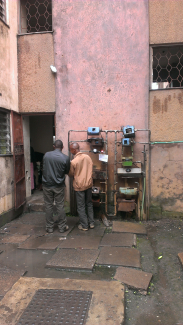Behavioural Nudges for Water Conservation in Unequal Settings
In the period 2015-2018, the City of Cape Town experienced a sustained drought that eventually reduced the city’s usable reserves to 10% of capacity. Fortunately, there were individual water meters in many homes, and as part of the city’s response to the water crisis, it was able to implement increasingly stringent water restrictions, using both price (higher water tariffs) and quantity (lower water pressure and legislated constraints on daily use by households).
Magnitude and Distribution of Electricity and Water Subsidies for Households in Addis Ababa, Ethiopia
In Addis Ababa, an increasing block tariff has been used to calculate households’ monthly bills for electricity and water services. This study estimates the magnitudes of the combined water and electricity subsidies received by households with private connections to the electricity grid and piped water network in 2016, and it evaluates the distribution of these subsidies among wealth groups.
Individual Incentives to cooparate within community-based resource management
This project develops a bio-economic model of sea turtle populations and egg/turtle harvest decisions as a basis for comparing across these various settings and approaches to sea turtle conservation
Subsidies delivered through the water tariff are not reaching the poor
Like many water utilities across the globe, Nairobi City Water and Sewer Company implements an increasing block tariff. Recent research conducted by EfD Kenya, however, finds that the increasing block
A Diagnostic Tool for Estimating the Incidence of Subsidies Delivered by Water Utilities in Low- and Medium-Income Countries, with Illustrative Calculations
It is conventional wisdom that poor households use less water than rich households, and intuition suggests that an increasing block tariff with a lifeline block will target subsidies to poor households.
Access to water as determinant of rental values: A housing hedonic analysis in Rwanda
In this paper, we study the determinants of rental values in urban housing markets in Kigali, Rwanda.
In particular, we study the value of access to piped water; due to the high costs associated with installing new piped connections, renting a property with an existing connection is often the only way for low income households to access piped water. Our results indicate that extending the piped network to a new house will in many cases raise the rental value of the house enough to pay for the cost of installing the new connection in less than two years.
Resistance to the Regulation of Common Resources in Rural Tunisia
We examine the effect of the introduction of uniform water-charging for aquifer management and provide evidence using a survey-based choice experiment of agricultural water users in rural Tunisia. Theoretically, we show that the implementation of the proposed second-best regulation would result both in efficiency gains and in distributional effects in favour of small landholders. Empirically, we find that resistance to the introduction of an effective water-charging regime is greatest amongst the largest landholders.
Risk perception, choice of drinking water and water treatment: Evidence from Kenyan towns
This study used household survey data from four Kenyan towns to examine the effect of households' characteristics and risk perceptions on their decision to treat/filter water as well as on their choice of main drinking water source. Because the two decisions may be jointly made by the household, a seemingly unrelated bivariate probit model was estimated. It turned out that treating non-piped water and using piped water as a main drinking water source were substitutes.
Pagination
- Page 1
- Next page
